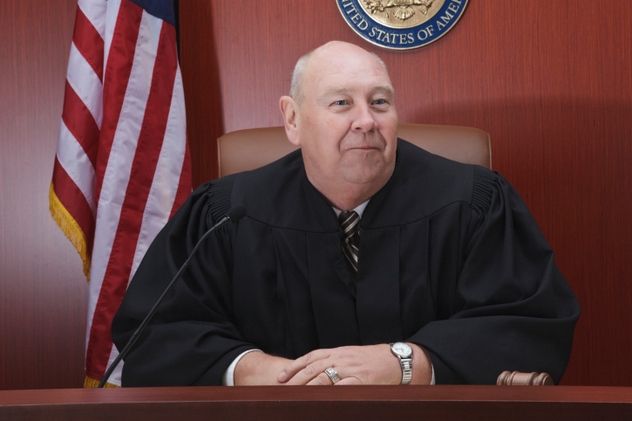 Movies and TV
Movies and TV  Movies and TV
Movies and TV  History
History 10 Extreme Laws That Tried to Engineer Society
 History
History 10 “Modern” Problems with Surprising Historical Analogs
 Health
Health 10 Everyday Activities That Secretly Alter Consciousness
 History
History Top 10 Historical Disasters Caused by Someone Calling in Sick
 Animals
Animals 10 New Shark Secrets That Recently Dropped
 Movies and TV
Movies and TV 10 Forgotten Realities of Early Live Television Broadcasts
 Technology
Technology 10 Stopgap Technologies That Became Industry Standards
 Weird Stuff
Weird Stuff 10 Wild Facts About Taxidermy That You Probably Didn’t Know
 Travel
Travel 10 Beautiful Travel Destinations (That Will Kill You)
 Movies and TV
Movies and TV 10 Box Office Bombs That We Should Have Predicted in 2025
 History
History 10 Extreme Laws That Tried to Engineer Society
 History
History 10 “Modern” Problems with Surprising Historical Analogs
Who's Behind Listverse?

Jamie Frater
Head Editor
Jamie founded Listverse due to an insatiable desire to share fascinating, obscure, and bizarre facts. He has been a guest speaker on numerous national radio and television stations and is a five time published author.
More About Us Health
Health 10 Everyday Activities That Secretly Alter Consciousness
 History
History Top 10 Historical Disasters Caused by Someone Calling in Sick
 Animals
Animals 10 New Shark Secrets That Recently Dropped
 Movies and TV
Movies and TV 10 Forgotten Realities of Early Live Television Broadcasts
 Technology
Technology 10 Stopgap Technologies That Became Industry Standards
 Weird Stuff
Weird Stuff 10 Wild Facts About Taxidermy That You Probably Didn’t Know
 Travel
Travel 10 Beautiful Travel Destinations (That Will Kill You)
10 Worrying Facts About Public Servants
They are often invisible to us, the people who make our society run. The sanitation workers that haul our trash from the curb before we even get out of bed, the bus drivers that bring our kids to school, the health inspectors that keep our food safe. Sometimes they can be an annoyance, like the cop who gives you a speeding ticket, but they are all necessary for us to live in relative harmony.
But public servants are people just like everyone else. Most of them are helpful and compassionate, yet they can also be subject to corruption, greed, and murderous impulses that often resonate across nations.
10Firefighters Let Homes Burn

It takes great courage to rush into a burning building while others flee, which is why firefighters are often called “the bravest.” In many areas, firefighters aren’t even paid but are dedicated volunteers. But in rural Tennessee, the local firefighters will only help if an annual fee is paid. They charge $75 a year to protect a house. In the event of a fire, those who refuse to pay are forced to watch helplessly as their homes are reduced to ash.
In 2011, firefighters responded to a blaze in South Fulton, Tennessee and did nothing as the house burned to the ground. In another incident in 2010, the Cranick family of Obion County lost everything they owned, including three dogs and a cat, when their home caught fire. Of course, like other extortive “insurance” policies, there is a truly disgusting caveat to this rule: An uninsured family, who is already losing everything, is afforded the last-minute option of paying $2,200 for the first two hours of firefighter assistance and $1,100 for each additional hour.
9The Police Are Killing Our Pets

Editor’s note: This list was written before recent events in Ferguson, Missouri and does not attempt to address the important issues being raised by residents in that city.
Nearly every week in the US, we are bombarded by some horror story of a police officer gunning down a beloved family pet. If you think these are rare tragedies, you’re sadly mistaken. A study published by the National Canine Research Council indicated that approximately half of all intentional police shooting victims are dogs. Certainly, the issue must be seen from both sides of the coin—in the heat of the moment, it can be impossible for an officer to tell whether a Rottweiler is advancing in cheerful greeting or in menace.
However, some incidents seem downright sadistic, such as the case of Deputy Jared Dooley from Rains County, Texas, who gunned down a blue heeler named Candy. Dooley’s dashcam footage seems to indicate that Candy was quite friendly, but that didn’t stop Dooley from shooting her in the head. He then informed the dog’s owner, Cole Middleton, “You’re about to be upset, but your dog charged me, and I had to shoot him.” Middleton was understandably distraught. Later, Dooley refused to put Candy, who was crying in agony, out of her misery. Middleton was forced to drown his own dog in a bucket. Dooley was fired from the department amid public outrage over the incident. In her necropsy, a veterinarian confirmed that Candy had actually been shot from behind.
In a seemingly clear-cut case of “looking out for their own,” most departments clear officers who have shot dogs of any wrongdoing. However, each incident is a public relations nightmare. The Department of Justice has even published a paper called “The Problem of Dog-Related Incidents and Encounters,” which aims to better educate officers on how to deal with animals in a humane fashion.
8Chaos On The School Bus

The Simpsons has been poking fun at public servants for decades, particularly the staff at Bart and Lisa’s elementary school. Perhaps the most ridiculous of these characters is Otto, the perpetually stoned bus driver. Unfortunately, there have been some truly horrible real-life bus drivers. A slew of drivers have been arrested for driving drunk, including 54-year-old Karl Herber of Minnesota, who, while intoxicated, actually crashed his bus into a tree. Luckily, none of the five children aboard were injured.
Children have also been sexually abused by bus drivers. John Martin Carrell, a bus driver from Utah, faces 34 first-degree felony charges for aggravated sexual abuse of a child. Carrell was caught on surveillance video inappropriately touching a five-year-old autistic girl on his bus.
Sometimes, the children themselves inflict cruelty. In 2012, 68-year-old bus monitor Karen Klein was subjected to vicious verbal abuse at the hands of several seventh grade boys in upstate New York. Eventually, the poor woman was driven to tears, which only made things worse. A 10-minute video of the incident went viral, inspiring one man to begin a fundraising campaign for Klein. In all, over $700,000 was raised. Karen spent $100,000 of the money to start the Karen Klein Anti-Bullying Foundation.
7Meter Maid Assaults

Parking tickets are one of those inevitable annoyances of life, like death and taxes. Parking tickets are usually distributed by meter maids, or parking enforcement officials, who are frequently abused by the public and accused of being overzealous in their duties. In London, things became so bad that in 2006, parking attendants were given stab-proof vests to defend themselves from assaults by infuriated drivers.
Things are no better in the US. In March 2011, 27-year-old Amanda Rojas ran over a traffic officer who tried to cite her in California, causing serious injuries to the officer’s back and head. Some attacks can be truly bizarre. In March 2014, 20-year-old Lorin Daniel Moll was arrested in San Diego, California. His crime? Hurling raw eggs at a parking enforcement officer from his apartment balcony. The officer wasn’t even ticketing Moll’s car at the time. Later, the officer, who asked not to be named, called Moll a “dipstick.”
6The Flashing Judges

Judges are among the most powerful people. In many instances, they alone decide a person’s fate—freedom, imprisonment, or death. As such, they are held to a higher standard of behavior, one that they are occasionally unable to live up to.
In 2006, 59-year-old Oklahoma judge Donald Thompson was sentenced to four years in prison for repeatedly exposing himself in his courtroom. Thompson was also reportedly fond of using a penis pump during trials. Court reporter Lisa Foster claimed that she frequently heard a “whooshing” sound as he played with his toy. Investigation turned up semen on the judge’s robe, chair, and carpet behind the bench. In 2011, the Oklahoma Supreme Court voted to deny him the $93,000-per-year pension he would have earned as a judge.
Bizarrely enough, this may not be the only case of a flashing judge. Sir Stephen Price Richards, a Lord Justice of Appeal in England, has been accused of flashing while riding on mass transit trains. Thus far, he’s managed to beat the rap.
5The Dangers Of Sanitation

If asked what the most dangerous job in public service might be, the average person will likely think of police officers and firefighters. However, this isn’t even close. In fact, when comparing fatality rates, the humble garbageman has a job twice as dangerous as a police officer and seven times more dangerous than a firefighter. The reasons are clear: These men deal with horrifying, vile conditions. They work with heavy machinery that could easily crush them at a moment’s notice, slinging bags of trash that could be filled with any number of sharp instruments. The typical sanitation worker lifts tons of such bags over the course of a shift. By the end of the day, they can be dangerously fatigued and prone to bad judgment. Drivers, frustrated by the slow progress of garbage trucks, will try to swerve around them and hit the sanitation workers. Then there is the question of dangerous refuse. Along with typical household trash, sanitation workers also deal with dangerous substances like acid and biomedical waste.
Sanitation workers are often on the front lines in an emergency, called upon to plow streets during blizzards and assist in the aftermath of hurricanes. The filth is so bad that many workers develop their own vernacular. In New York, maggots are called “disco rice,” and used condoms are known as “urban whitefish.”
Sadly, their all-too-frequent deaths fail to receive the attention given to those in other branches of public service. However, in June 2014, hundreds of sanitation workers showed up for the funeral of 43-year-old Steven Frosch, who was killed in a garage in Maspeth, Queens. Frosch, who was struck by a street sweeper, was sent off with a standing ovation. This probably was little consolation to his wife and four children, including a seven-week-old infant who would never get to know his father.
4Health Inspectors Bribed

Food poisoning is no joke. In the United States alone, the Centers for Disease Control and Prevention estimates that 48 million people are sickened annually, with 3,000 dying. Thus, the job of health inspectors—who oversee places like restaurants, supermarkets, and manufacturing plants—is incredibly serious. In most situations, we blindly put our trust in the place we eat out, never knowing what is unfolding in the kitchen. Sometimes, that trust is misplaced. For example, the New York Health Department recently closed down Dominique Ansel’s famed cronut bakery due to a severe mouse infestation. (The shop is up and running again now, hopefully with fewer mice in the vicinity.)
Unfortunately, health inspectors can be as greedy as anyone else. In 2012, retired Chicago food inspector Maryanne Koll was sentenced to two and a half years in prison for taking nearly $100,000 in bribes from hundreds of people. The year before, a pair of inspectors were charged for taking bribes in San Francisco. Among their “clients” were well-known restaurants like Burger King and Popeye’s Chicken and Biscuits.
In the late 1980s, New York City saw a sweeping corruption scheme in its Health Department, and 43 individuals were charged with various crimes. Even clean restaurants were targets of these corrupt inspectors. In one instance, a restaurant owner who couldn’t speak English was threatened with a drawing of a rat into paying a bribe.
3Shortage Of Public Defenders

Atticus Finch in To Kill A Mockingbird made the position of public defender seem both heroic and honorable, but the truth is somewhat murkier. In the United States, public defenders are assigned to people who cannot afford to retain their own counsel. Unfortunately, this system is deeply flawed. There is certainly little incentive to take the job. A person has to work his way through law school, often taking on a massive student loan debt in the process. Defenders are overworked and underpaid, making a pittance compared to those working in private firms.
Even those public defenders who are talented and dedicated just don’t have the time to properly represent their clients. Nowhere is the problem worse than in the blighted city of Detroit, Michigan. There, misdemeanor cases are handled by a private contractor (read: the lowest bidder), whose five part-time employees handle so many clients they can only dedicate just over 30 minutes to each person’s case. In many instances, this is terribly detrimental to the accused. Yet, in other cases, it can work out wonderfully for them, as courts will often release the accused for “time served” if they don’t ask for representation.
2The IRS Conspiracy

There are few things people despise more than paying taxes, which is why the IRS is a particularly reviled organization. But in 2013, it was revealed that the evils of the IRS extend far beyond auditing the little man. In a seemingly Orwellian conspiracy, the agency spent years applying close scrutiny to targeted organizations seeking tax exempt status. These were largely conservative groups, but liberal groups were also targeted.
Words singled out included “Tea Party,” “Israel,” and “medical marijuana.” It is unclear just how far up the political ladder this scandal climbed, but those it seemed to focus on have historically been in opposition to the Obama administration. There has been a massive public outrage, with some calling the corruption “tyranny.” There have also been resignations, including that of Lois Lerner, an IRS official at the center of the issue. The FBI continues to investigate, but this process has been woefully undermined by the IRS. In June 2014, the IRS reported a computer crash that mysteriously erased Lois Lerner’s emails from January 2009 to April 2011.
1Killer Teachers

Given that we entrust our children to their care, teachers are expected to keep themselves relatively free of vice. However, some have proven to be the very worst people on the planet. Some teachers had sexual relations with their students, including women like Mary Kay Letourneau and Pamela Smart, whose lives have since been turned into TV movies.
Some are far more sinister, including Russian serial killer Andrei Chikatilo, who taught literature. Less well known is Albert Fentress, a Poughkeepsie middle school teacher who lured 18-year-old high-school student Paul Masters into his basement. Masters was tied up, tortured, and eventually shot in the head. Fentress then proceeded to cannibalize the corpse. He admitted to his crime and has been locked away in mental hospitals for over 30 years. He has been petitioning for his release. In 1999, a jury ruled in his favor, but a judge rejected their decision.
Mike Devlin is an aspiring novelist.








